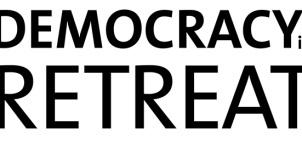Democracy in Retreat: A Divided Egypt
Democracy has long been upheld as the ideal way to run a country. America, “land of the free” is revered for its representative government elected by the people for the people, and the US has committed to a mission of spreading and supporting democracy worldwide. In Joshua Kurlantzick’s newest book Democracy in Retreat: The Revolt of the Middle Class and the Worldwide Decline of Representative Government, he argues that nations are actually moving against democracy as a solution. When newly democratic governments appear to fail, public opinion is often swayed to believe democracy is not an effective option.
 Democracy in Retreat is especially relevant to the current situation in Egypt. This July, their first publicly-elected president, Mohamed Morsi, was overthrown after just one year in office. Morsi attempted to undertake some democratic initiatives, such as firing certain ineffective military officials who were not publically elected, granting defendants greater rights in court cases, and creating a presidential website, where citizens could offer feedback on the administration. At the same time, reporters and a TV personality were jailed for expressing criticism of the president and the Muslim Brotherhood. Citizens were tortured, raped, and killed, and the Egyptian economy continued to suffer. Kurlantzick cites a major study showing that in 2012, “about 40% of Egyptians did not believe democracy was the best system of governance for the country,” even before Morsi could complete a year in office.
Democracy in Retreat is especially relevant to the current situation in Egypt. This July, their first publicly-elected president, Mohamed Morsi, was overthrown after just one year in office. Morsi attempted to undertake some democratic initiatives, such as firing certain ineffective military officials who were not publically elected, granting defendants greater rights in court cases, and creating a presidential website, where citizens could offer feedback on the administration. At the same time, reporters and a TV personality were jailed for expressing criticism of the president and the Muslim Brotherhood. Citizens were tortured, raped, and killed, and the Egyptian economy continued to suffer. Kurlantzick cites a major study showing that in 2012, “about 40% of Egyptians did not believe democracy was the best system of governance for the country,” even before Morsi could complete a year in office.
Fearful that Morsi would force Islamic authoritarianism on the country, many Egyptians fought to overthrow him, obtaining 20 million signatures on a petition demanding his removal (more than the 13 million votes Morsi won in his election). The military decided to depose Morsi, and are currently detaining him in unknown whereabouts. Backlash from the military takeover resulted in a divided Egypt and mass emigration.
During Morsi’s time in office, many Egyptians felt corrupt ballot boxes were no longer the way to get their voices heard and took to the streets in protest. A recent Time magazine cover displayed an image of the rallies, reading “Egypt: World’s Best Protesters, World’s Worst Democrats.” It could be argued that Time’s cover is unfair, considering Morsi’s opposition believes that by protesting a leader who is no longer fit to rule their country, they are exercising the very foundations of democracy. A New York Times article quoted one male anti-Morsi demonstrator as saying “We had to show Morsi that we could get rid of him if we didn’t like him just like we got rid of the one before him. What the Egyptian people did is pure democracy.”
The big question to answer is: is it more democratic to elect a leader or to overthrow one? Supporters of Morsi are angered by the President’s upheaval, feeling that the military got rid of the “people’s choice” by removing Morsi from office; however, Morsi would not have been removed if the people also had not chosen to overthrow him in the first place. The conflict remains irreconcilable as both sides believe they are exercising democratic values. When democratic practices result in the election of an undemocratic leader, it becomes difficult to define what democracy truly is.
Many are also skeptical about whether democracy can make a comeback under the authoritative control of the military-led interim government. The Egyptian armed forces claim that they are attempting to keep the nation in a state of calm until elections for a new leader can begin. But with citizens killed and injured in attempts to quash opposition to the military, are military governments working towards or away from democracy? And some citizens, especially the middle class, support a military takeover, believing that the armed forces will act as a check against Islamists, crime, and violence. The middle classes, who Kurlantzick claims are integral to the success of a democracy, are often suspicious of democratic rule out of fear that if the poor are all backed behind one candidate, their own needs will be ignored if that candidate wins.
Despite the many problems posed for democracy in the Middle East, Kurlantzick remains committed to democracy as an institution and discusses how it can successfully come about, even in countries like Egypt. Part of his solution is to assert civilian control over the armed forces and separate the military from national politics, like Indonesia has done. This would be especially important for countries such as Egypt and Syria, where their governments have been inextricably tied to the military, often against the people. In order to do so, Kurlantzick suggests that civilian leaders may have to create incentives for the military to cooperate with such a transition, such as increasing the defense budget or reserving certain privileges and rights to the armed forces.


























